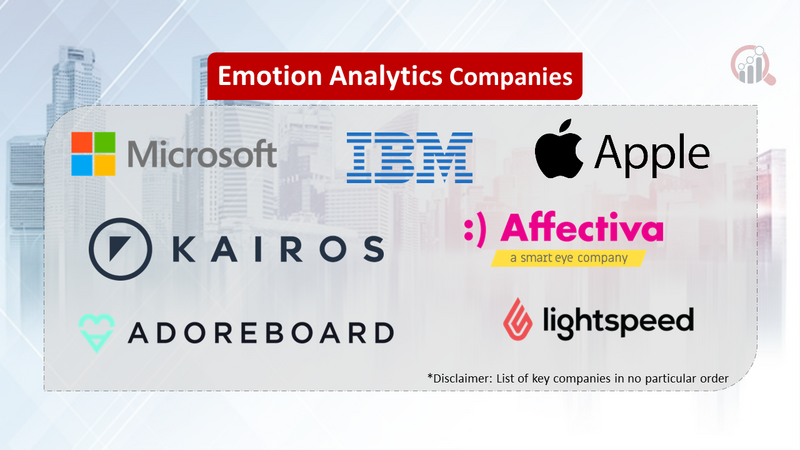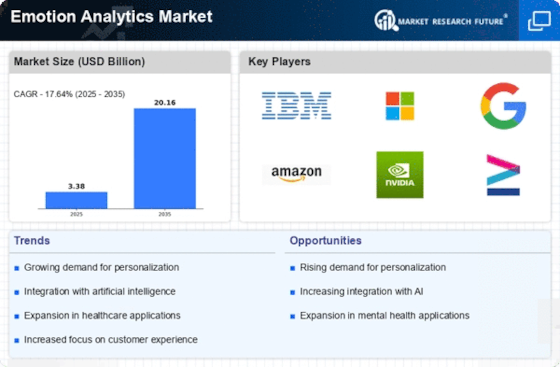Top Industry Leaders in the Emotion Analytics Market

Competitive Landscape of the Emotion Analytics Market:
The emotion analytics market is a dynamic space experiencing rapid growth, fueled by advancements in artificial intelligence (AI), machine learning (ML), and natural language processing (NLP). This technology unlocks the power to understand human emotions through various data sources, including facial expressions, voice tonality, text analysis, and physiological signals. As organizations recognize the potential of emotion insights, the competitive landscape is heating up, with established players vying for dominance alongside innovative newcomers.
Key Players:
- Microsoft Corporation (U.S.)
- International Business Machines Corporation (U.S.)
- Apple, Inc. (U.S,)
- Retinad Virtual Reality Inc. (Canada)
- Neuromore Inc. (U.S.)
- Imotions A/S (Denmark)
- Kairos AR, Inc. (U.S.)
- Beyond Verbal (Israel)
- Affectiva (U.S.)
- Eyris (EmoVu) (U.S.)
- Adoreboard (U.K.)
- sensation.io (Germany)
- iMotions (U.S)
- RealComm Global LLC (U.S)
- Lightspeed LLC (U.S.)
Factors for Market Share Analysis:
- Technology Breadth and Accuracy:The ability to analyze a wider range of data sources (facial, vocal, text, physiological) and deliver accurate emotion recognition across diverse demographics is crucial.
- Application Focus and Industry Expertise:Companies catering to specific industry needs, such as healthcare or finance, with tailored solutions often find success.
- Ease of Integration and Scalability:Solutions that seamlessly integrate with existing software platforms and can be scaled to handle large data volumes are preferred.
- Data Privacy and Security:Ensuring robust data security and ethical use of emotional data is paramount, especially for consumer-facing applications.
Emerging Players and Innovation:
- Start-ups:Companies like Heartbeat AI and Yuyidata are developing AI-powered emotional wearables and biosensors, opening new frontiers for emotion analysis in healthcare and wellness.
- Academic Spin-offs:Universities are actively researching and developing novel emotion recognition algorithms, creating a pipeline of future market entrants.
- Open-source Initiatives:The rise of open-source emotion analysis libraries like OpenFace and EmoPy is democratizing access to this technology, fostering collaboration and innovation.
Current Investment Trends:
- Focus on AI and Machine Learning:Increased investments are directed towards developing advanced AI and ML algorithms for more accurate and nuanced emotion recognition.
- Expansion into New Applications:Companies are exploring the potential of emotion analytics beyond traditional research, venturing into areas like education, personalized learning, and mental health.
- Strategic Partnerships and Acquisitions:Collaborations and mergers are on the rise, as established players seek to acquire niche expertise and expand their product offerings.
Latest Company Updates:
Dec 22, 2023: Affectiva, a leading emotion analytics company, announced a partnership with Microsoft to integrate its Emotion AI technology into Microsoft Teams. This will allow users to gain insights into meeting participants' emotions and engagement levels.
Nov 15, 2023: Google AI unveiled a new emotion recognition model called "EmoNet" that can identify emotions from facial expressions with high accuracy. This technology has the potential to be used in various applications, such as customer service and education.
Oct 26, 2023: Sony launched a new line of smart TVs equipped with emotion recognition technology. The TVs can adjust the content and settings based on the viewer's emotional state.










